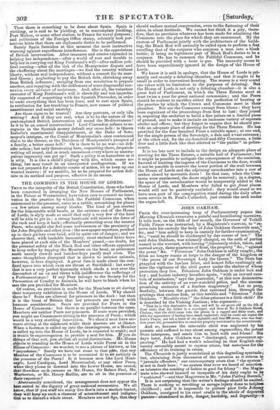ENGLAND IN THE MEDITERRANEAN.
IF certain signs are to be trusted, the perturbed spirit that has for some time animated the Foreign Office in Downing Street is not yet laid. Active endeavours are seen in various quarters of the press to make out that English interests are at this parti- cular time specially threatened in the Mediterranean ; and the newspaper agitation looks as if it were meant to serve by way of anticipative apology for some wholesale meddling.
The Greek Government is going on as ill as can be : the Mi nister Coletti is ever fraudulent, ever arbitrary ; after instigating Kin°. Otho to insult the Turkish Ambassador, he refuses the apology which might heal the breach ; there is reason to suppose that Coletti has more deference for French M. Placatory than for English Sir Edmund Lyons ; finally, the Greek Govern- ment evades payment of the interest due on the loan which Eng- land along with two other Powers has guaranteed. But was not all this known before? Matters were even worse a few months back, when the Greek Minister was actually intimidating the little Legislature, than they are now. There is nothing new, unless it is the determination in a certain quarter, now that the Cracow and Montpensier squabbles have ceased to furnish excite- ment, to fill up idle time with a Greek squabble, involving dispu- tation and endless diplomatic correspondence with the Courts of Athens, Bavaria, Constantinople, St. Petersburg, Paris, &c. &c.
Not long since we noted a sudden sensitiveness to French ra- pacity in Northern Africa. That rapacity is not a new incident. Neither is it alarming. No race has succeeded in holding both the Northern and Southern shores of the Mediterranean since the lax and partial occupation by the Romans. Northern Africa cannot, within any period cognizable by human foresight, be a source,. but must be a drain, of strength. Towards the interior there is a frontier that absolutely forbids settled civilization ; hence the occupant must be for ever engaged in conquering the ter- ritory he occupies, because his occupation will for ever be contested by savage frontier tribes. The occupation of Northern Africa
would not diminish but augment the insuperable difficulties which prevent France from making the Mediterranean "a French lake." There is nothing new either in French rapacity or in this view of the securities against it : the novelty seems to be a sudden sense in the Foreign Office that something must be done to counteract thin French policy, which so conveniently finds its own counteawc, dons.
Then there is something to be done about Spain. Spain is yielding, or is said to be yielding, or to contemplate yielding, Port Mahon, or some other station, to France for naval purposes ; and politicians of the Foreign Office stamp, solemnly look por- tentous hints that there are diplomatic duties to be performed. Surely Spain furnishes at this moment the most instructive warning against superfluous interference. She is the opprobrium of British intervention. After treasures and armies expended in helping her independence—after a world of cost and trouble to help her in carrying out King Ferdinand's will—after endless poli- tical nursing—after all the risk of the Montpensier dispute and the chaffering about the marriages—we find the country without liberty, without real independence, without a consort for its mar- ried Queen ; neglecting to pay the British debt, shrinking away from British influence; escaping from one revolution to prepare another, and repaying with the defilement of some disgraceful con- nexion every advance of assistance. And, after all, the volunteer executor of King Ferdinand's will is shrewdly and not improba- bly suspected of coquetting with the Spanish Pretender, in order to undo everything that has been done, and to cast upon Spain, in retribution for her truckling to France, new causes of political unsettlement and social anarchy.
Are these signs to be trusted? Are they portents, or only idle writing/ And if they are real, what is to be the nature of the contemplated British intervention all round the Mediterranean ? Is it to be an armed intervention Lord-Clarendon refuses to re- cognize in the Spanish money default any emus belli : is Queen Isabella's matrimonial disappointment, or the Duke of Soto- mayor's intrigue, or the Count of Montemolin's once contemned claim to the throne, or the Dutchess of Montpensier's prospect of a family, a better cants belli? Or is there to be no war—no defi- nite action; but only threatening here, coquetting there, despatch- writing all round, and as much uneasiness everywhere as unscru- pulous ingenuity can get up ? Such a policy is as hazardous as it is silly. It is like a child's playing with fire, which means no- thing, but may result in an unexpected conflagration. If we are not prepared for a definite course of action, let us keep up our wonted reserve : if we meddle, let us be prepared for action defi- nite in its method and purpose, effective in its means.



























 Previous page
Previous page